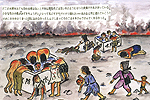PDF version
Download [pdf, 1.32 Mb]Editorial
-

The abolition of nuclear weapons and achieving cultural disarmament - the hidden objectives in the fight for peace
Rafael GrasaFrom now on, it will be impossible to recount any history as if it was the only one. There cannot be just one history, because there are numerous points of view (John Berger)
Prevent the ship from sinking while we build a ship of the new generation (Otto Neurath)
Raimon Panikkar, the most influential Catalan thinker in the history of Catalonia since Ramon Llull, died in Tavertet in late August (see the ICIP blog). His work, like his way of life, gives us lessons and ideas that can be very helpful in the construction of peace, and very useful in the year which commemorates the 65th anniversary of Hiroshima and Nagasaki and the fortieth anniversary of the Nuclear Non-Proliferation Treaty, which saw its eighth Review Conference in New York in May 2010, which was preceded by an alternative conference. This is why he is the central feature of issue number 4 of Peace in Progress, with articles by Jordi Armadans, Rafael Grasa and Rebecca Johnson.

In depth
Central articles
-
After the NPT, green light for a Nuclear Weapons Convention
Rebecca Johnson -
The future of nuclear weapons and the non-proliferation regime: the need to combine disarmament and arms control
Rafael Grasa -
Civil society calls for the abolition of nuclear weapons
Jordi Armadans -
Hibakusha Statement: 'Humans Cannot Coexist with Nuclear Weapons'
Sumiteru Taniguchi
-
Finding out more
-
About nuclear armament
On this occasion we offer three types of materials that we feel may be of use in learning more about subjects related to nuclear armament.

-
Interview
-

Interview with Lilia Yusupova and Elena Vilenskaya
Maëlle Savidan. Ricardo AlmanzaLilia Yusupova is a member of the "Memorial" organisation in Chechnya, and Elena Vilenskaya represents the "House of Peace and Non-violence" organisation and the “Mothers of Saint Petersburg soldiers". Both activists work for Human Rights, against war, injustice and impunity in Russia and Chechnya. On the International Women's Day for Peace and Disarmament, the two activists were invited to Barcelona by the organisation "Dones x Dones" ["Women x Women"] with the support of the "League for Peoples' Rights" as part of the project "Together for a peace of our own".

-
Platform
-
The Barcelona Declaration on the Human Right to Peace
Carlos Villán Durán -
Civil Peace Service: a European commitment to non-violent conflict resolution
Rubén Campos
Recommendations
-

Philosophy of Peace
Francisco Fernández Buey, Jordi Mir i Enric Prat (eds.). Filosofía de la Paz. Barcelona: Icaria, 2010.
The book Philosophy of Peace presents the thought of sixteen authors who have reflected on war and peace in a timeframe between the XVIII century and the modern day. The book includes texts by by the following authors specialising in thought and practice: Immanuel Kant, Henry D. Thoreau, Lev Tolstoy, Bertha von Suttner, Rosa Luxemburg, Mohandas Gandhi, Virginia Woolf, Simone Weil, Hannah Arendt, Albert Einstein, Bertrand Russell, Martin Luther King, E. P. Thompson, Petra Kelly, Sean Mac Bride and Noam Chomsky.

-

Against the kingdom of the beast: E.P. Thompson, the critical conscience of the cold war
José Ángel Ruiz Jiménez. Contra el reino de la bestia: E.P. Thomson, la conciencia critica de la guerra fría. Universidad de Granada, 2009.
The world's most frequently quoted historian in the twentieth century is still little-known in Spain, and his work as an activist for peace is even less so. That is why reading this book on Edward Palmer Thompson is worthwhile. At a time when models and extraordinary individuals are lacking, we can find inspiration in the man who was probably one of the most lucid and influential critical consciences of the Cold War.

Més recomanacions
News
ICIP News
-
Seminar on the consolidation of peace in Côte d'Ivoire
-
New book collections
-
International Day of Peace at the ICIP
-
Approval of the Declaration of Barcelona
-
Participation in the biannual conference of the International Peace Research Association (IPRA)
-
Israeli soldiers participate in a talk at the ICIP
-
International News


